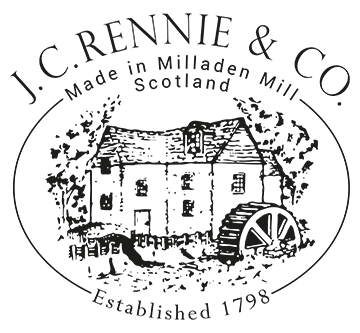MADE IN SCOTLAND

Our yarn is spun from wool to woollen yarn in Aberdeenshire, in the north east of Scotland. The process of manufacturing Scottish woollens is very different from that typically used by manufacturers outside the UK and has changed little since the Industrial Revolution. The melange shades inspired by "The Colours of Scotland" are made up of blends of many different colours of wool, fused together during the process of carding in one of J C Rennie's five cast-iron carding sets.
We are one of only a handful of woollen mills still remaining in Scotland, and probably the last of the pioneering woollen mills that perfected the Shetland quality on the Scottish mainland.
Rennie uses British sourced wool where it can but all lambswool fleece is sourced from either New Zealand or Australia. This has a lot to do with the climate and the ability of these countries to produce consistently good quality wool at a large volume.
This may be a surprise to some outside the industry but please consider the tradition of importing good quality lambswool fleece from the former colonies has changed little since the Industrial Revolution, and is now part of the romance and tradition of nations perfecting products in Europe from raw materials grown far away, such as Cashmere from Mongolia to make Scottish Cashmere, coffee and cocoa beans from South America to make Italian Coffee and Belgium Chocolate, etc.
Also consider the sheep in these countries roam in a largely free range, vast and unspoilt terrain, and the environmental steps being taken by countries like New Zealand, whom are also working to become 100% carbon neutral by 2035, are commendable.
Despite the millions of meat growing sheep in the UK the quality of the wool grown here at the quantity required is just not available for us to provide you with the best quality yarn. British wool is mostly only suitable or carpets, probably due to the wet maritime climate in these isles.
There are exceptions of course, and we would be one of the first to buy local wool when it becomes available to us at the right quality and quantity.

